 | « Back to article | Print this article |
'Clearly, from the Indian viewpoint, the US retrenchment from Asia cannot be happening as good news.'
'The abandonment of the US' pivot to Asia exposes the US-Indian partnership to be a mere transactional relationship,' says Ambassador M K Bhadrakumar in the concluding part of his appraisal.

The best part about Donald Trump's foreign policy will be that the gathering storms on the horizon presaging a New Cold War -- or worse still, a war between the United States and Russia -- are about to disperse.
The two theatres where the easing of US-Russia tensions will manifest will be Ukraine and Syria, which seemed intractable conflicts that, some feared, might even draw the two big powers even into a nuclear war.
However, the main difference could be that while Ukraine problem can be settled between the US and Russia -- with Europe heaving a sigh of relief -- that may not be the case with Syria where there are multiple regional players pursuing their own agenda and working at cross purposes.
Besides, the US' capacity to influence the regional players -- especially Turkey, Israel, Iran and Saudi Arabia -- is in serious doubt. That alone makes it virtually impossible for Trump to isolate America from the Middle East. The region is in a shambles, too.
Trump has not spoken of a Middle East policy as such in regional terms or tried to place the Syrian conflict within a broader framework of regional security and stability.
What he signalled so far has been a total aversion to the idea of the United States venturing into a military intervention in Syria.

Trump views Syria almost exclusively through the prism of terrorism, which is, of course, insufficient.
Trump firmly places himself on the same page as Russian President Vladimir Putin in endorsing the latter's opinion that the fight against terrorism and the extremist groups is the top priority today and everything else becomes secondary.
He has gone a step further than any Western statesman to publicly voice unequivocal support for the Russian intervention in Syria. It indeed needed some gumption to do that.
But the smartest thing that Trump might have done in his entire foreign policy plank through the election campaign was the great care he took care to keep a line open to Russia for the future when the easiest thing to do was to have partaken of the cacophony by the Russophobes in the American establishment.
Trump seemed to have figured out the crucial importance of working with Russia and Putin if at all he is to make any headway in addressing the Middle East crisis that is weighing down US foreign policies.
Prima facie, therefore, prospects look good for ending the Syrian conflict. But, as mentioned above, there are caveats. In fact, there is a strong likelihood that the Middle East may turn out to be an albatross around the Trump Presidency.

First of all, by launching the US offensive against the Islamic State's 'capital city' of Raqqa in northern Syria, Obama is attempting to create new facts on the ground.
Obama should not have waded into the Syrian conflict so blatantly in the final weeks of his presidency. His motivation at this stage -- either a question of legacy or to create an opening for Hillary Clinton to intervene later -- remains unclear.
But his move is highly risky insofar as the US forces have been committed on the frontline in the push to capture Raqqa.
No matter what Trump may have said about not intervening in Syria, Obama has literally forced his hands to an extent.
Ironically, though, Obama is leaving Trump with no option but to work with Russia at the politico-military level, an option which Putin always welcomed but Obama himself had doggedly resisted.
If Obama's gambit succeeds through the coming 6 to 8 weeks, he could have the limited satisfaction of claiming the legacy of driving out the IS fighters from their capital into the Syrian deserts.
But the bigger probability is that in such a short period of time before January, the offensive cannot succeed and in such an eventuality, Obama will have literally passed on to Trump's hands a can of worms.
The point is, occupying Raqqa and arranging its 'governance' will pose a formidable challenge for the Trump presidency even before it has settled down.
Meanwhile, the IS is far from a vanquished entity. Again, the US' main ally, the Syrian Kurds, have their own agenda of creating a Kurdistan in northern Syria, whereas, Turkey, a NATO ally, is even more determined to prevent that from happening.

Quite obviously, what is needed is a high degree of cooperation and coordination between the US and Russia at the political, diplomatic and military level.
This would logically involve on the one hand a candid conversation with Putin, which Trump has hinted at, and on the other hand, a forceful demarche with the US' traditional allies in the region to stop arming the Syrian extremist groups.
Here the picture is not necessarily all that dismal. Trump has spoken of his intent to strengthen relations with Turkey's authoritarian president Recep Erdogan.
On the other hand, Russian-Turkish rapprochement also restrains Erdogan's hands. The key lies in Erdogan's cooperation.
If Erdogan can be persuaded to play a positive role in the search for a Syrian settlement, Saudi Arabia and Qatar will fall in line.
Then, there is the US' relationship with Israel. To what extent will Trump continue to commit US' resources to underwrite Israel’s budget or 'security' remains to be seen.
The Israeli lobby may have to start from ground zero with the Trump presidency. Trump owes nothing to the Jewish constituency in winning the election. This is an unusual situation in American politics.
On the contrary, Obama has given a parting gift of an unprecedented $38 billion military aid package to Israel. Now, this is exactly the sort of thing Trump has said he'd find abominable -- 'free riders' extracting unilateral advantages out of American tax payers.
Basically, it remains to be seen how far Trump would go to differentiate the US' interests in the Middle East from Israel's.
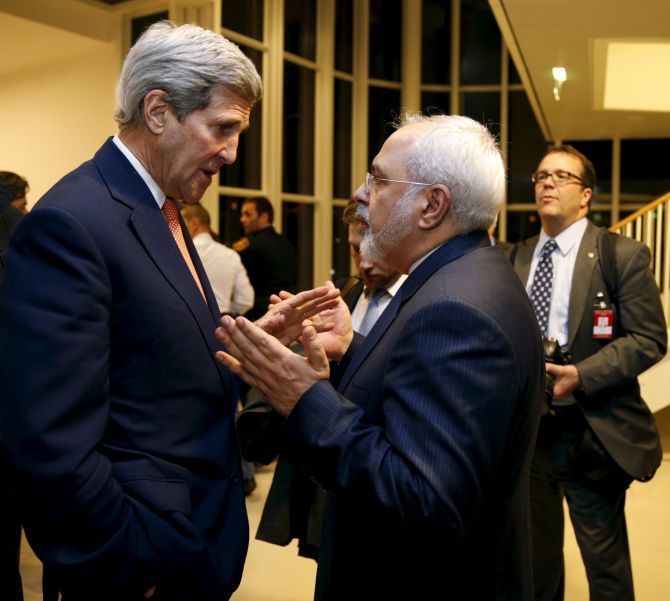
Again, when it comes to the all-important implementation of the Iran nuclear deal, there is no clarity so far as to the line Trump may take.
This will largely determine the trajectory of a meaningful US-Iranian engagement without which the US' regional policies in the Middle East will continue to remain ineffectual, as successive American administrations have found.
Trump has spoken on contradictory terms on the Iran nuclear deal, which implies he is conscious of the need to move cautiously.
Israel and Saudi Arabia will be delighted if Trump revokes the nuclear deal as that would increase their dependence on him and his vulnerability to their pressure.
But a showdown with Iran will be catastrophic for Trump's Middle East and global strategies, because he will only be isolating the US in the process in regional politics, since the Iran nuclear deal is the outcome of a P5+1 negotiation and is no reason for the other big powers (Russia and China, in particular) -- or for the United Nations Security Council -- to tear up the agreement unless and until Iran ceases to implement it in good faith, which it has been doing so far.

Fundamentally, therefore, the Middle East will test the efficacy of Trump's thinking that US interests will be the sole criterion for him in deciding on the need for American interventions.
Can he clinically separate US interests from Israel's interests, for example?
Can he do plain speaking with the Saudi regime that their existential worries and phobias are not his business?
Will he terminate the US involvement in the Saudi war in Yemen?
Can he afford to let Israel and Saudi Arabia dictate the US policies toward Iran?
There are no easy answers. Evidently, Trump has a lot of things to think through to navigate his way in the Middle East region.
Meanwhile, the fight against terrorism will be a key element in Trump's foreign policy. Since the 9/11 attacks, the US has so far successfully kept the war against terrorism away from American shores and has managed to wage it in faraway countries.
Obama has been remarkably successful in 'outsourcing' the war and playing geopolitical games with it.
It involved doublespeak at times, the US keeping covert links with extremist groups at other times, and even acquiescence with the US allies' activities in actively fostering terrorist groups.
One cannot visualise Trump who has worn Islamophobia on his sleeves will stoop so low to conquer. For him it is a fight in black and white terms -- without ambiguity or prevarications.
But then, in the quicksands of the Middle East's politics, it is also difficult to wage a one-dimensional war.
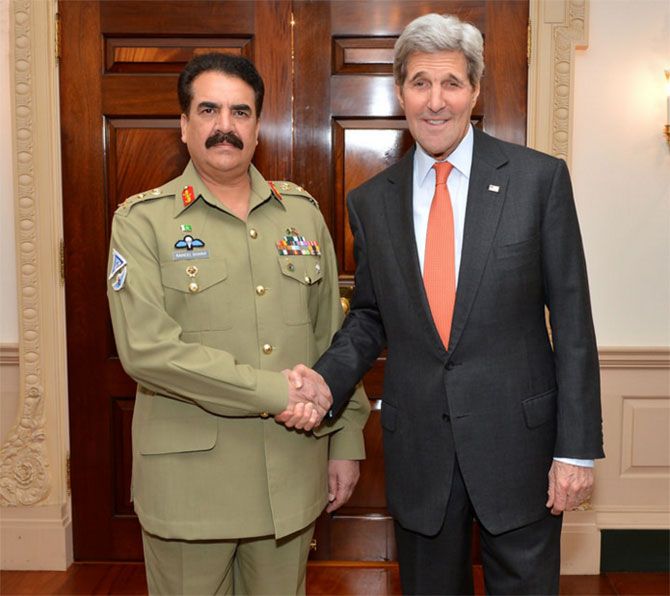
Paradoxically, this presents countries such as Saudi Arabia or Pakistan to give a fresh start to mend their troubled relationship with the US -- and, arguably, to evolve a new type of relationship with America.
For sure, Trump needs their cooperation in the war against terrorism. The possibility is always there that Saudi Arabia will find a way to meet Trump's agenda and that would be the basis of a common ground, enabling the relationship to be put on a new footing.
After all, Trump as a businessman has dealt with the Gulf sheikhs.
Given these complex realities -- and many others such as oil pricing, petrodollar recycling, arms exports, military bases -- it is inconceivable that there could be any US retrenchment from the Middle East during at least the first term of the Trump Presidency.

In turn, the US' neck-deep involvement in the Middle East makes it virtually certain that we are witnessing the last gasps of Obama's signature foreign policy initiative, the 'Pivot to Asia.'
Trump has vowed to bury the Trans-Pacific Partnership, TPP, agreement and it is improbable now that in the remaining weeks in office, Obama will even waste his time to get Congressional approval for it. The mood in Congress in any case is negative toward the TPP.
Yet, the TPP was intended to be the underpinning for the US' containment strategy against China. Defence Secretary Ashton Carter had once pointed out that 'in the broadest sense, passing TPP is as important to me as another aircraft carrier.'
Thus, for all purposes, the geopolitical reality will be that a distracted America is set to pull back from Asia.
Pax Americana is already looking shaky in the region with key partners such as the Philippines, Malaysia and Thailand stepping out to commence or intensify their direct dealings with China bilaterally with the US being reduced to the role of a passive spectator.
It cannot be lost on the Asian countries that Trump's hectoring comments on China entirely focused on trade issues and currency. Trump has said nothing really to censure, leave alone challenge, China's sovereignty issues in the South China Sea.
Again, it remains to be seen how far Trump can carry out his threat of slapping across-the-board tariff hike of 45 percent against imports from China, as that would surely invite retaliation by China, including by eroding the profit margins of big American companies doing business in China.
In any case, the issues of discord in trade and currency exchange matters that exclusively monopolise Trump's focus on China are by their very nature such that the old post-war alliance system in Asia serves no purpose for the US to pile pressure on China.
Thus, we are coming to a point where the US' alliance system in Asia is becoming redundant in Trump's order of priorities, while, on the other hand, the US' Asian allies -- Japan and South Korea -- are not in a position to hold the US to its defence commitments when Trump has derisively portrayed them as free riders.
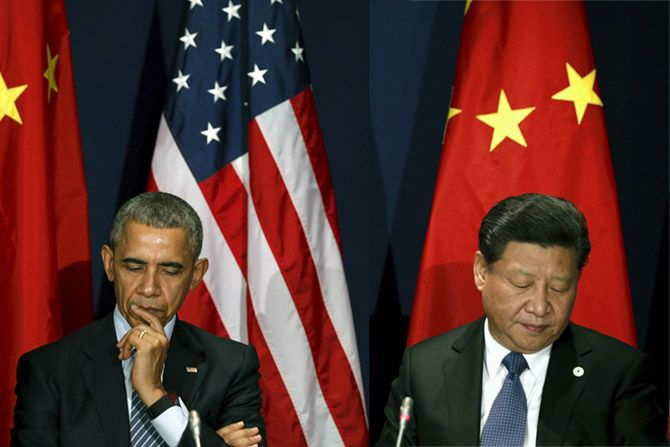
All this works to China's advantage in its quest to upend the US' strategic dominance in its neighbourhood since World War II. China is unlikely to feel perturbed by Trump's economic threats.
Deal-making comes naturally to China and Beijing will count on its ability to negotiate pragmatic outcomes with a successful businessman like Trump.
On his part, Trump will also be on a learning curve and will sooner rather than later discover the reality that it is useful to have China with him to solve global problems and, more importantly, that the interdependency between the two big powers has touched such a level that America can prosper only if China does.
In sum, the Trump presidency presents China with a range of new opportunities. To be sure, dramatic changes in the security environment in Asia-Pacific are in the offing.
Although not directly affected by the US retrenchment from Asia, India will watch the shifts in the power dynamic in the region with concern. In the most recent years, India had shown the inclination to identify with the US' pivot strategy in Asia.
India's Act East policy was tiptoeing toward forming an informal Asian alliance system involving Japan and US, riveted on the security cooperation with the US with the intent to push back at an increasingly assertive China, while negotiating with China from a position of advantage.
Consequently, there are signs of strains appearing in India-China relations in the most recent period, with Beijing has hardened its stance on issues of concern to India. China is also making new inroads into the South Asian region, which wittingly or otherwise erode India's influence in its traditional backyard.
Clearly, from the Indian viewpoint, the US retrenchment from Asia cannot be happening as good news. The abandonment of the US' pivot to Asia exposes the US-Indian partnership to be a mere transactional relationship.
But this is not the only impact of a Trump presidency on India's interests. Although Trump appears to have nothing but warm sentiments toward India, his mercantilist policies limit the scope for any serious collaboration between the two countries under the rubric of 'Make in India,' which is Prime Minister Narendra Modi's pet project.
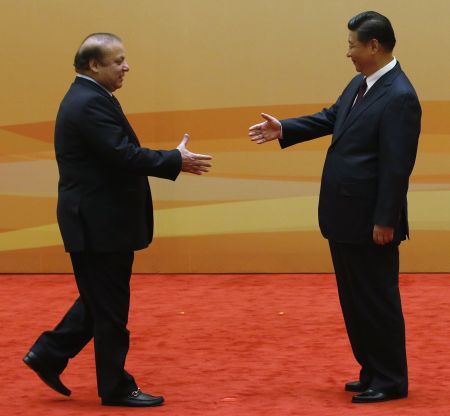
To be sure, the two big issues of worry ought to be Trump's approach toward India's two main adversaries -- China and Pakistan. Needless to say, any shift toward a G2 (US-China condominium) will seriously impact India's interests.
The Indian policies through much of the past decade are predicated on assumptions over the US-China rivalry playing out in the Asian theatre. Indian strategists had even begun rechristening Asia-Pacific as 'Indo-Pacific.'
Now, the spectre that is haunting India is that it is entirely conceivable that Trump may encourage China to play a more direct role in the regional security and stability, especially with regard to Afghanistan and Pakistan, on lines similar to what he may adopt with Russia in the Middle East.
It is hard to see Trump getting the US immersed in the affairs of the Hindu Kush or Central Asia. He will not hesitate to concede China's legitimate interests in those faraway regions that are peripheral to the US' vital interests.
As for the core concerns over terrorism, Trump may well find it expedient to leave it to China to 'tackle' Pakistan -- that is, unless takes the initiative to make a profound course correction on its sponsorship of militant groups and offers itself as an engaging partner of relevance to Trump's economic priorities.
A complete withdrawal of the US troops from Afghanistan and the closure of American military bases in that country would be entirely conceivable, which might become a turning point in regional politics, goading China to assume more responsibilities as a provider of security.
As things stand, China is a stakeholder insofar as regional security and stability also happens to be a ore-requisite for the successful implementation of the $50+billion China-Pakistan Economic Corridor.
Equally, as time goes by and as Trump gains more confidence in his dealings with the Chinese leadership, the US-China engagement at a practical level could morph into a broad Sino-American understanding to pool their resources to moderate India-Pakistan tensions.
The bottom line here is that China will be eager to engage Trump on such terms, which serves China's core interests in the stabilisation of Pakistan, apart from the optics of it elevating its status as a responsible global power and stakeholder in regional and international security.
Most certainly, China would see positive fallouts of such an entente with the US on the geopolitical alignments in Asia-Pacific as well, the theatre that constitutes China's First Circle of core interests.
Significantly, President Xi Jinping invoked the 'Sunnydale spirit' in his congratulatory message to Trump and mentioned China's keenness to move forward on a 'new type of relationship' with the US.
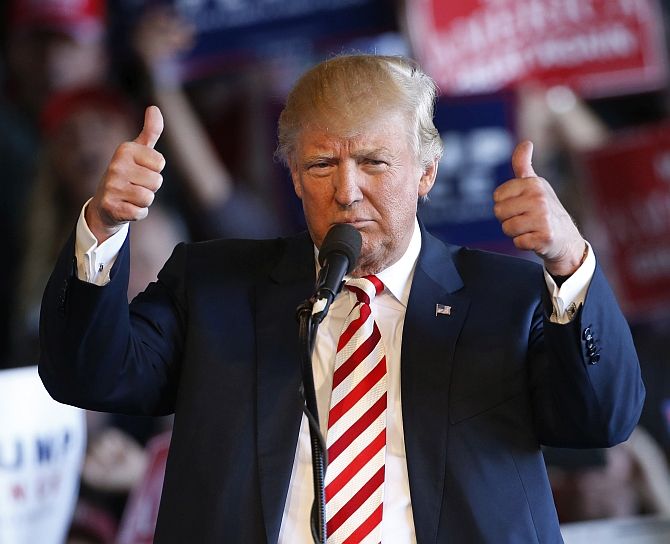
All in all, we may anticipate that the world of tomorrow in the Trump era will begin to look fundamentally different from the US-dominated international order that seemed to live forever following the 'death of Communism' and the collapse of the Soviet Union.
On an intellectual plane, Trump's biggest contribution to the strategic discourses of the 21st century will be that he will put away as shibboleth the entire mythology that the US 'won' the Cold War.
Trump will insist on the US breaking loose from the entrapment of its triumphalist post-Cold War narrative that began with the break-up of Yugoslavia and the expansion of the NATO into the territories of the former Warsaw Pact member countries of Central and Eastern Europe.
Quintessentially, a three-way balance of forces involving the US, Russia and China could be in the making, a sort of 'entente cordiale' to stabilise the world order and to address the global problems more effectively.
Europe could have been -- and, perhaps, should have been -- a constituent of such a process. But Trump's neglect of the US' trans-Atlantic leadership role, his near-certain disinterest bordering on indifference toward the future of the European Union, and an end to the US policies single-mindedly aiming at the marginalisation of Russia as a legitimate European power -- all these promise to radically transform the climate of European security.
In the short term, turbulence will increase in Europe, as Le Pen's surge in France signals. Europe will be immersed in existential issues as regards the future of the EU and NATO and this will also be taking place at a time of economic difficulties and growing social unrest.
China has already appeared on the horizon as a new player in Europe. The announcement last week by China regarding the creation of a multi-billion dollar investment fund (aiming to stimulate $50 billion for investment) for the countries of Central and Eastern Europe only goes to underscore that Europe's strategic landscape is already changing.
Much of the angst in the US foreign and security policy establishment and the strategic community at large over Trump's rise as the new boss in the Oval Office, bordering on a visceral dislike toward him, can be put in perspective.
In a nutshell, there is great nervousness in their minds. They apprehend that Trump may compel them to exorcise the 'unipolar predicament', and bring foreign and security policies to reflect the desires and priorities of the American public.
The good thing is that if Trump succeeds, it will work to the strengthening of the current tendencies toward a multipolar world order and the stability of the international system.